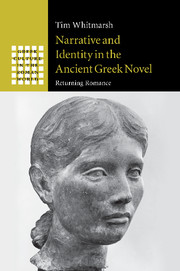2 - Transforming romance
Achilles Tatius and Longus
Published online by Cambridge University Press: 03 May 2011
Summary
The first-century romances of Chariton and Xenophon mimic the Hellenocentric model of the classic passage-rite myth, whereby the urban, aristocratic Hellenic ‘home’ is offset against the barbarian ‘abroad’. From the second century, romance patterns shift radically. Of the later romances, at least judging by the extant texts, none is centrist in this way. Achilles Tatius' Leucippe and Clitophon and Longus' Daphnis and Chloe, the second-century subjects of this chapter, focus on the Syrian littoral and rural Lesbos respectively, while Heliodorus' fourth-century Charicleia and Theagenes (the subject of the next) ends in Ethiopian Meroe. Fragmentary texts are, in the nature of things, harder to interpret (and indeed date) with confidence, but the two remaining romances for which the plot is relatively clear fit this trend away from first-century urban Hellenocentrism. The first-century Metiochus and Parthenope, which survives in Greek fragments and a Persian version, is centred on the court of the tyrant Polycrates of Samos, while the second-century Babylonian affairs of Iamblichus is the only known romance entirely to avoid Greek figures and Greek settings.
It looks very much, then, as if the romance form shifted radically at the end of the first century, claiming as its own the margins of the world rather than its centres. It is possible, of course, that this pattern is nothing more than a coincidence, the result of nothing more than the aleatory processes of transmission.
- Type
- Chapter
- Information
- Narrative and Identity in the Ancient Greek NovelReturning Romance, pp. 69 - 107Publisher: Cambridge University PressPrint publication year: 2011

